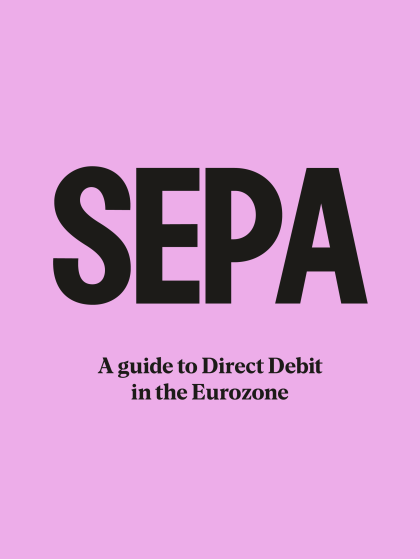Written by
Reviewed by
Last editedMay 2022
Explanation of the key terms used in SEPA Direct Debit
| Term | Meaning |
|---|---|
| Acceptable equivalent | An electronic channel offering a security level considered sufficient by the merchant’s bank and accepted in the EPC e-Operating Model for e-Mandates. |
| Pre-notification | Notice that must be given, under the Scheme rules, to customers of each payment before it leaves their account. |
| BIC (Banking Identifying Code) | A code developed by the International Organization for Standardization (ISO) to identify banks and their branches. |
| Bureau | An organisation that submits Direct Debit requests to the bank on behalf of a 3rd party, who may or may not have their own Creditor Identifier. |
| Calendar days | A calendar day is any day of the year. |
| Refund | A payment refunded to the payer. Customers who claim a refund within the relevant time limits will be refunded immediately and in full. |
| Creditor Identifier | A unique identifier issued to every Creditor under the SEPA Direct Debit scheme. |
| e-Mandate | Process for authorising a SEPA Direct Debit mandate online, instead of with a paper form. |
| IBAN (International Bank Account Number) | International Bank Account Numbers (IBANs) are the international bank account numbers assigned to you and your customers. You can find your IBAN on your account statement or via Internet Banking. |
| Interbank business day | An inter-bank business day is when banks are open for business between banks. The 'Trans-European Automated Real-time Gross Settlement Express Transfer System' (TARGET) calendar is used to identify inter-bank business days. To avoid frequent changes to TARGET closing days, due to national holidays for example and thus the introduction of uncertainties into financial markets, a long-term calendar for TARGET closing days has been established and applied since 2002. This calendar is published by the European Central Bank. |
| ISO 20022 | ISO 20022, the International Organisation for Standardisation, use XML as the international standard format for payment messages. |
| Mandate | An authorisation from your customer to collect future payments automatically. To set up a mandate your customers must complete a standardised form. |
| Mandate form | A paper form that customers must complete to authorise a mandate to you. |
| Mandate related data | The data elements from the mandate which should be included with each collection. |
| Microenterprise | An enterprise which employs fewer than 10 persons and whose annual turnover and/or annual balance sheet total does not exceed EUR 2 million. |
| Modulus Check | A procedure for applying a mathematical algorithm to an Account Number (or an account number and Sort Code combination) to check that it is valid. |
| SEPA | The Single Euro Payments Area (SEPA) is a payment-integration initiative of the European Union for simplification of bank transfers denominated in euro. |
| Sponsor Bank | A bank that enables you to access the Direct Debit Scheme and provides you with a Creditor Identifier. |
| Unauthorised Transaction | A SEPA direct debit is deemed to be an unauthorised transaction if:
|
| Unique Mandate Reference | This reference identifies for a merchant each Mandate signed by any of their customers. This number must be unique for each Mandate in combination with the identifier of the Creditor. |
| XML format | XML is a mark up language that is both human and machine readable. This means that if you look at a XML document you will be able to see information including, your payment batch information, your supplier name and IBAN information. |


